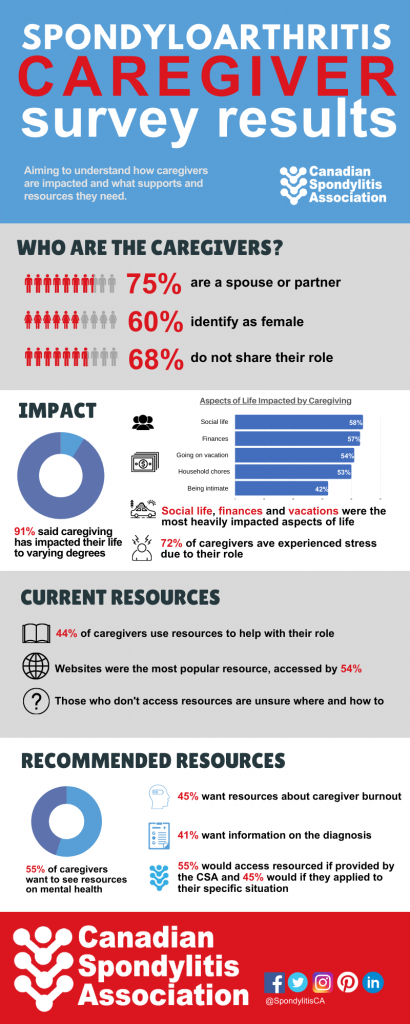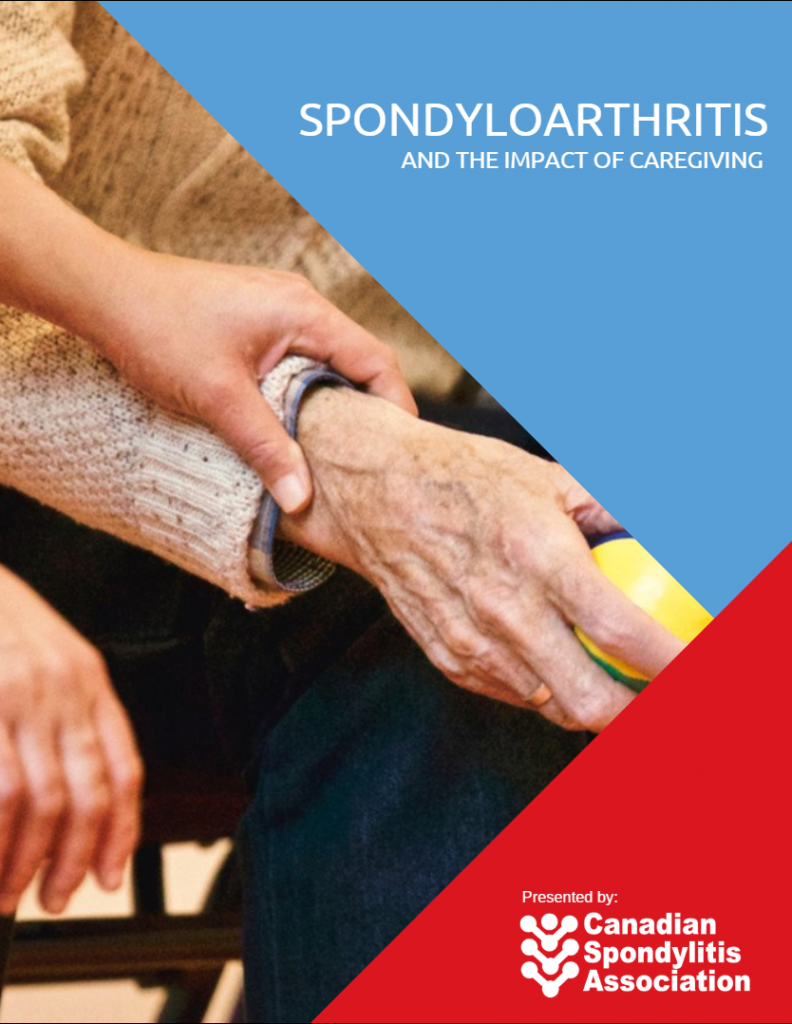If you are a caregiver of a family member, friend or loved one; you are one of 8+ million Canadians, or 21% of the Canadian population, who share the same role in some capacity.

By recognizing, facilitating and supporting caregivers, we can improve the overall experience, environment and outcomes for all involved, patients and caregivers.
In 2019, the Canadian Spondylitis Association surveyed over 75 caregivers to gain a better understanding of what it means to be a caregiver, the impact of caregiving on life, and current useful resources. We also questioned participants about the type of resources they needed most. The survey revealed that the majority of caregivers do not share their role. Social life, finances and vacation time were the most heavily impacted aspects of life. Most caregivers would like to receive resources regarding mental and emotional health, accessing services and support and caregiver burnout.
Providing care can impact your quality of life. You are not alone!
See below for helpful credible sources on topics identified in the survey as important to caregivers. We will continue to add a variety of resources to support caregivers as they are available.
If you have any comments or suggestions, please email info@spondylitis.ca. We want to hear from you!
Resources:
Share Our InfoGraphic on Social Media
-On Desktop – Right Click -> Save As
-On Mobile – Long Press -> Share image

[rescue_toggle title=”Information about Spondyloarthritis: “]
41% of survey participants indicated that they would like more information to help understand the diagnosis.
- Canadian Spondylitis Association: What is Spondyloarthritis?
- Canadian Spondylitis Association AS and PsA guidebooks:
- The Arthritis Foundation, Spondyloarthritis
- WebMD, Spondyloarthritis
[/rescue_toggle]
[rescue_toggle title=”General Caregiving Advice : “]
- Carers UK (carersuk.org) – although based in the UK, their guide called “Looking After Someone” has some great general advice for someone new to the caregiving role. It acknowledges the feelings, situations, and struggles one has in caring for someone, even though some of the links and resources will not be accessible for you in Canada.
- Government of Canada, Care Conversations (https://www.canada.ca/en/employment-social-development/corporate/seniors/forum/care-conversation.html) – describes the caregiving role, how it may affect you, and what your role is in a person’s health care team.
- Government of Canada, Caregiver Readiness (https://www.canada.ca/en/employment-social-development/corporate/seniors/forum/caregiver-readiness-video.html)
- AARP, Family Caregiving (https://www.aarp.org/caregiving/) – an American resource with many articles and tips on caregiving, as well as caregiver stories.
- Living My Culture (http://www.livingmyculture.ca/culture/)– this resource has advice, support, and resources for people with different cultural backgrounds, available in several different languages. Though there is an emphasis on palliative care, there is advice on caring for illness.
- Living My Culture (http://www.livingmyculture.ca/culture/)– this resource has advice, support, and resources for people in with different cultural backgrounds, available and in several different languages. Though there is an emphasis on palliative care, there is advice on caring for illness.
[/rescue_toggle]
[rescue_toggle title=”Navigating the Canadian Health Care System : “]
47% of surveyed caregivers indicated that they needed resources regarding accessing services and support. Below are links to help you navigate the health care system in Canada.
- The “How To” Health Guide (http://www.healthcharities.ca/media/30187/HCCC_HowToHealthGuide_2016_EN-Final.pdf)
- Developed by the Health Charities Coalition of Canada to assist patients and caregivers to navigate the Canadian Health Care System.
- Includes information on how to evaluate health information on the internet, how to speak with health care providers, how to ask for a second opinion, how medical coverage works across Canada, how to get support, drug approval processes in Canada, and more.
If you are caregiving on your own:
68% of caregivers do not share the role.
Caregiving can differ from person to person. For some, it’s a full-time job, while for others it can be less demanding. We encourage people to assess their personal situation and take steps to try to build in appropriate supports (ordering grocery for delivery, getting a house cleaner once or twice a month, getting help with yard work, taking time for a massage, yoga or something else you enjoy.)
Try smartphone apps to assist you in your role:
- 10 Daily Apps to Help Caregivers Take Care of Their Loved Ones
- The Best Caregiving Apps of 2018
- If you’re a younger caregiver, say the child of a parent:
- Elizz – a smartphone app that allows you to chat with someone and receive emotional support, build resilience, as well as deliver personalized resources.
Try articles, podcasts, webinars, or workshops to assist you in your role: Many caregivers indicated that hearing from people who have the same experience as them is beneficial.
- Caregiving.com (https://www.caregiving.com/)
- An American resource devoted to many caregiving experiences, with many blogs, podcasts, webinars, conferences, courses, and training kits to support the entire caregiving experience.
- An American resource devoted to many caregiving experiences, with many blogs, podcasts, webinars, conferences, courses, and training kits to support the entire caregiving experience.
- Today’s Caregiver ((https://caregiver.com/)
- Another American resource, Today’s Caregiver is a magazine that showcases different people who are caregivers, provides articles about caregiving, and includes interviews of those who are caregivers.
- Another American resource, Today’s Caregiver is a magazine that showcases different people who are caregivers, provides articles about caregiving, and includes interviews of those who are caregivers.
- Young Carers Program (https://www.ycptoronto.com/)
- For caregivers who are children under the age of 18. Defines who young carers are, and support young carers through programming, support, and workshops in Toronto.
[/rescue_toggle]
[rescue_toggle title=”Emotional/Mental Health/Stress Management Resources: “]
Over half of the respondents have experienced stress, feelings of being overwhelmed and anxiety due to caregiving. 55% indicated that they would like resources about mental and emotional health.
It’s important to find ways to try and reduce stress and anxiety – easier said than done. We recognize there is no one magical formula and that what works for one person may not work for another. It’s important to find what works for you – for some talking to a friend does the trick and for others speaking with a therapist. Find things that help you and don’t be afraid to ask for help. Taking time for you will help everyone!
- TEDx – Caring for a Loved One is Hard Work – 6 Ways You Can Fight Burnout (https://ideas.ted.com/caring-for-a-loved-one-is-hard-work-6-ways-you-can-fight-burnout/)
- Compassion Fatigue and Self-Care Tips, CAMH (https://www.camh.ca/en/camh-news-and-stories/is-there-a-cost-to-protecting-caring-for-and-saving-others-beware-of-compassion-fatigue)
- Powerful Tools for Caregivers – Relaxation Recordings (https://www.powerfultoolsforcaregivers.org/free-downloads/)
[/rescue_toggle]
[rescue_toggle title=”Spousal/Partner Caregiving and Maintaining Positive Family and Social Relationships: “]
Many caregivers emphasized that impact that dealing with chronic disease had on their relationship and family dynamic.
- Carers UK: Your Relationships (https://www.carersuk.org/help-and-advice/your-relationships) – some tips and advice on social relationships, partner/spouse relationships, and caring for a parent.
- The Caregiver Exchange (https://www.caregiverexchange.ca/Insights/2) – insights into other caregivers’ experiences
- Look under the ‘Books’ section for more resources on this subject
[/rescue_toggle]
[rescue_toggle title=”Self-Care: “]
42% of caregivers are interested in resources about self-care.
- Canadian Women’s Health Network, Self Care for the Caregiver (http://www.cwhn.ca/en/node/40811)
- Carers UK: Supporting You To Take a Break video series (https://www.carersuk.org/help-and-advice/supporting-you-to-take-a-break)
- AARP, Respite Care: Create a Plan to Give Yourself a Caregiving Break (https://www.aarp.org/caregiving/life-balance/info-2017/respite-care-plan.html)
- The Caregiver Exchange (https://www.caregiverexchange.ca/41/) – The Caregiver’s Bill
[/rescue_toggle]
[rescue_toggle title=”Tips for Better Sleep: “]
28 respondents (37%) said they their sleep hygiene was affected by caregiving.
- Canadian Virtual Hospice: Sleep and Caregivers (http://www.virtualhospice.ca/en_US/Main+Site+Navigation/Home/Topics/Topics/Providing+Care/Sleep+and+Caregivers.aspx)
[/rescue_toggle]
[rescue_toggle title=”Managing Employment and other Financial Resources:“]
Finances was the second highest area of life impacted by caregiving, with 57% of respondents indicating that it was impacted.
- 7 Tips to Managing your Finances as a Caregiver (https://www.smartaboutmoney.org/Topics/Retirement-and-Aging/Aging-and-Money/7-Tips-to-Managing-Your-Finances-as-a-Caregiver)
- The Globe and Mail – Most Canadian Caregivers are Paying Too Much Tax, Here’s How to Remedy That (https://www.theglobeandmail.com/investing/personal-finance/household-finances/article-how-canadian-caregivers-can-better-care-for-their-finances/)
- Service Canada: Caregiving Benefits and Leave (https://www.canada.ca/en/services/benefits/ei/caregiving.html) – outlines the program, who is eligible, and links you to the application form
- Government of Canada: Income and Benefits from Government Programs (https://www.canada.ca/en/employment-social-development/corporate/seniors/forum/government-income-benefits.html)
- Government of Canada: Financial Planning (https://www.canada.ca/en/employment-social-development/corporate/seniors/forum/plan-finance.html)
- Government of Canada: Managing and Protecting One’s Assets (https://www.canada.ca/en/employment-social-development/corporate/seniors/forum/manage-protect-assets.html)
- Government of Canada: Planning for Possible Loss of Independence (https://www.canada.ca/en/employment-social-development/corporate/seniors/forum/independence-loss-planning.html)
- Government of Canada: Balancing Work and Caregiving Responsibilities (https://www.canada.ca/en/employment-social-development/corporate/seniors/forum/tips-caregivers.html) – offers advice on mentioning your caregiving role to your employer and how to talk to them to get the supports you need at work.
[/rescue_toggle]
[rescue_toggle title= “Home Management/Chore Resources:“]
53% of caregivers said that household chores were affected in their lives.
There are many options to help with household chores including hiring a house cleaner or service to do the yard work. If your financial situation doesn’t allow you to hire someone; ask a friend or relative to give you a hand. Perhaps your local high school has a volunteer program.
- Today’s Menu – Home Cooked Meals from Freezer to Table in the Toronto/GTA Area (https://www.todaysmenu.ca/). Caregivers get a 10% discount for orders over $75! In the discount box, key in ‘caregiver10’.
- Try grocery delivery services like Save On Foods (https://www.saveonfoods.com/shop-online-how-it-works/) or Walmart (https://www.walmart.ca/en/grocery/N-117).
- Put out an ad on Kijiji, Craigslist, or Facebook for extra help around the house.
- Try smartphone apps that save you from doing extra tasks, like mobile banking apps.
[/rescue_toggle]
[rescue_toggle title=”Location-Specific Resources and In-Person Support Groups“]
- British Columbia
- Family Caregivers of British Columbia: https://www.familycaregiversbc.ca
- Alberta
- Caregivers Alberta: https://www.caregiversalberta.ca/
- Family Caregiver Centre- Alberta Health Services: http://www.albertahealthservices.ca/services.asp
- Saskatchewan
- Caregiver Information and Support, Saskatoon Council on Aging: http://www.saskatooncaregiver.ca/
- Ontario
- The Ontario Caregiver Organization: https://ontariocaregiver.ca/
- Family Service Toronto: https://familyservicetoronto.org/our-services/programs-and-services/seniors-and-caregivers/
- Quebec
- L’Appui pour les proches aidants : https://www.lappui.org/en
- RANQ : Regroupement des aidants naturels du Québec : http://www.ranq.qc.ca/
- New Brunswick:
- Government of New Brunswick Caregiver’s Guide: https://www2.gnb.ca/content/gnb/en/departments/social_development/seniors/content/caregivers_guide.html
- Nova Scotia
- Caregivers Nova Scotia: https://caregiversns.org/
- Newfoundland and Labrador
- SeniorsNL: http://seniorsnl.ca/family-friend/family-friend-support/
- Government of Newfoundland and Labrador Information for Seniors, Families and Caregivers: https://www.gov.nl.ca/cssd/seniors/info/
- Health Canada: Respite for Family Caregivers- An Environmental Scan of Publicly-funded Programs in Canada: https://www.canada.ca/en/health-canada/services/health-care-system/reports-publications/home-continuing-care/respite-family-caregivers-environmental-scan-publicly-funded-programs-canada.html
- Carers Canada: https://www.carerscanada.ca/
[/rescue_toggle]
[rescue_toggle title=”Social Media Channels and Online Support Groups“]
- The Caregiver Space
- The caregiverspace.org is a space for all caregivers. Their website offers resources and they provide a support group on Facebook. https://thecaregiverspace.org/?fbclid=IwAR0QKwwYHVK-LXt29Gc-3_94Mk9KUsLReIC3lnVMPhVbJwCFxbMp8KYndy4
- This care.com article links many in-person and online caregiver support groups. https://www.care.com/c/stories/5766/caregiver-support-groups/
Nedrata Tawwab – Boundaries and Relationships
r/Autoimmune
r/Autoimmunity
r/Caregiving
[/rescue_toggle]
[rescue_toggle title=”Books“]
- When the Man You Love Is Ill: Doing Your Best for Your Partner Without Losing Yourself by Dr. Dorree Lynn and Florence Isaacs
- In Sickness as in Health: Helping Couples Cope with the Complexities of Illness by Barbara Kivowitz and Roanne Weismann
[/rescue_toggle]

